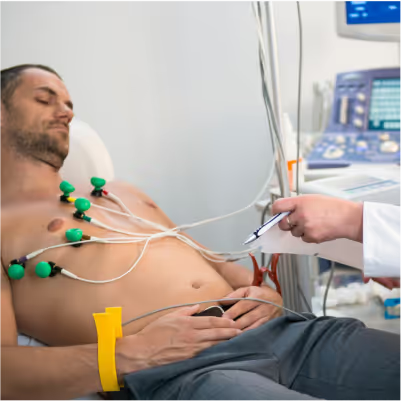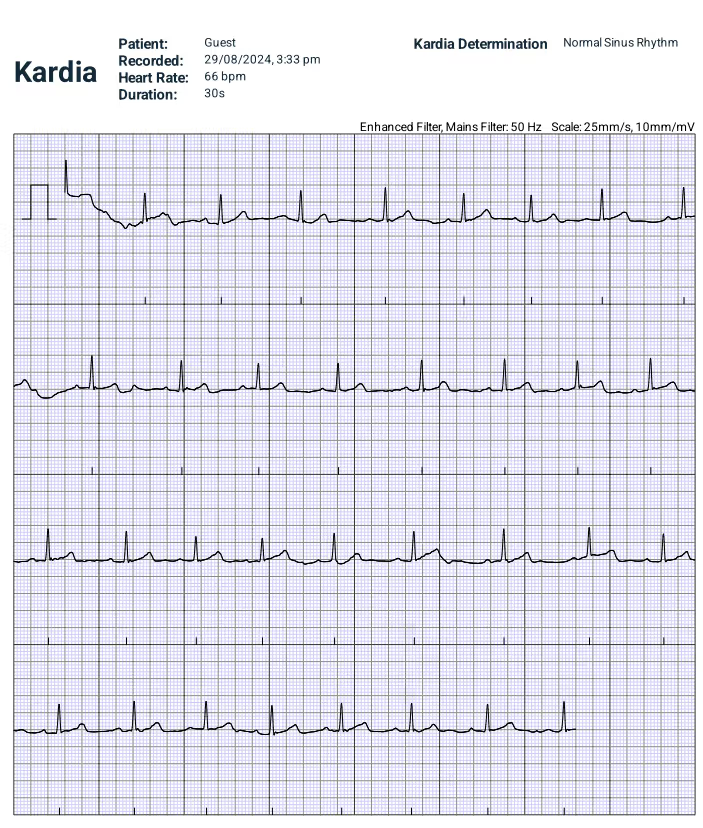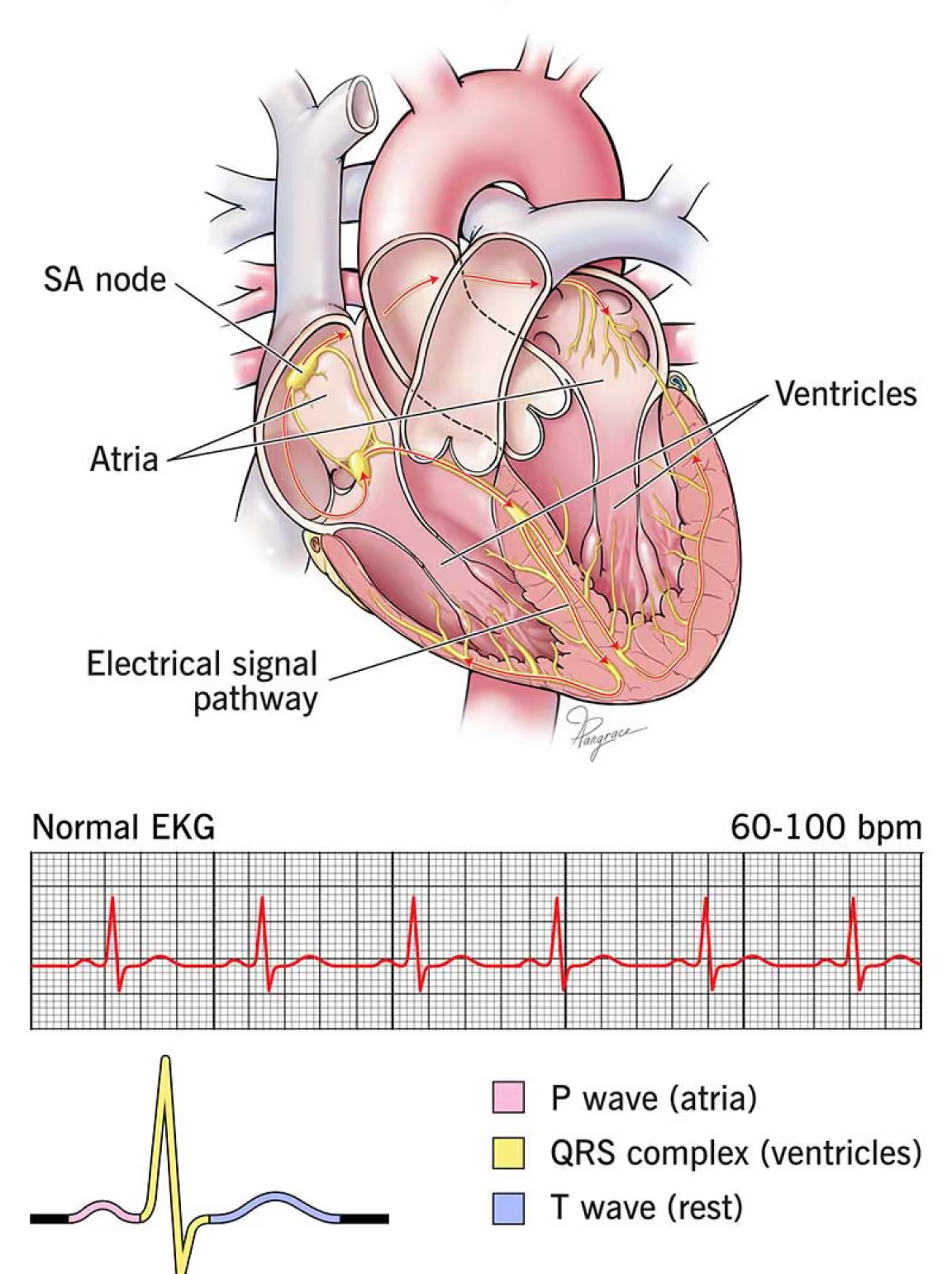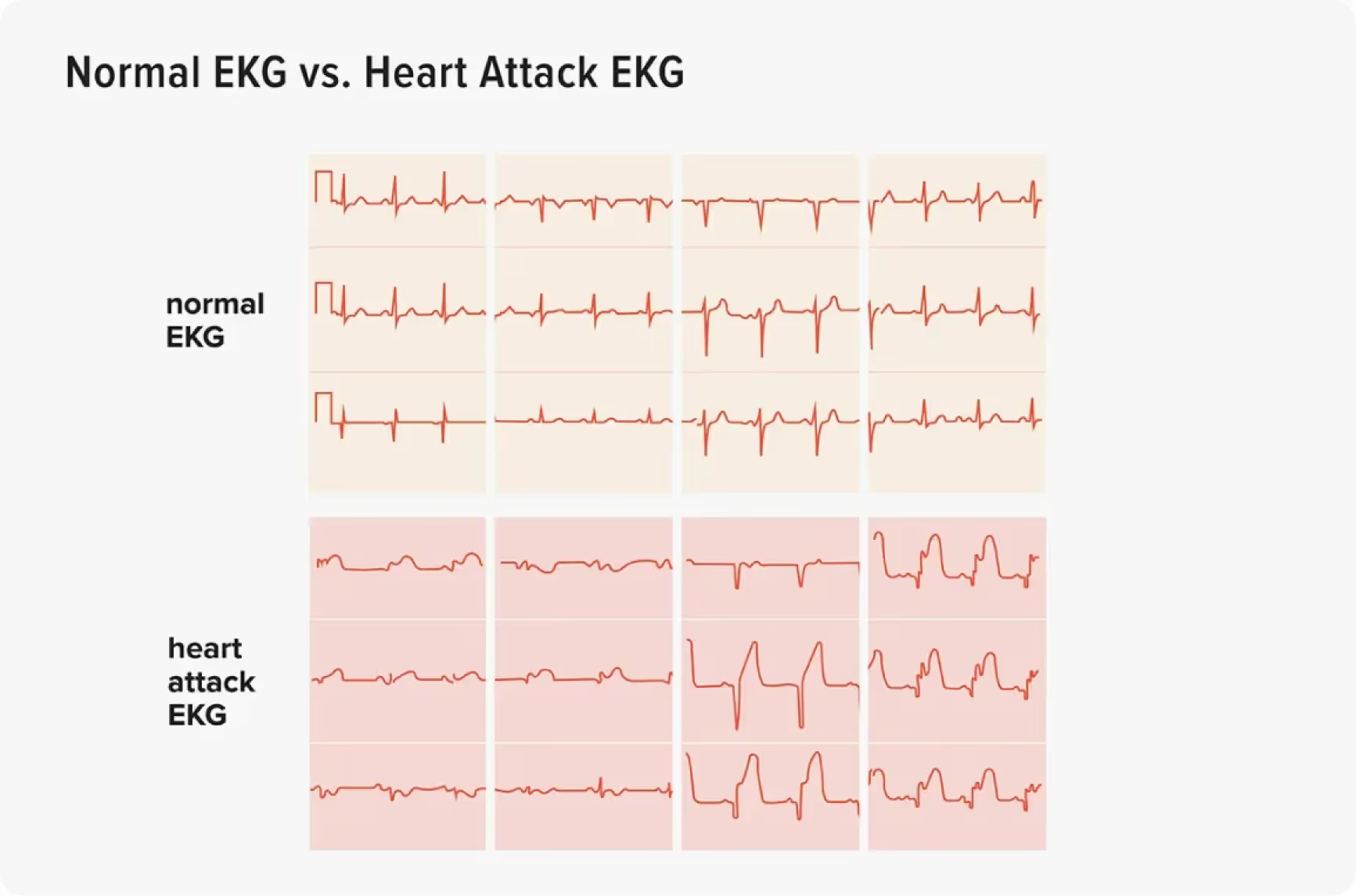Electrocardiogram Test (ECG)
ECG tests are vital diagnostic tools in cardiovascular medicine that focus on assessing heart health, with various types available to address specific cardiac concerns. Whether you're searching for an ecg test in Australia or an ekg test in Australia, these procedures play a crucial role in detecting heart disease, arrhythmias, and heart attacks, as well as monitoring the heart's response during exercise. Tailored to individual needs, these tests provide detailed insights into the heart's electrical activity, allowing for early detection of cardiovascular issues and helping guide timely, personalised interventions that can significantly impact overall health and wellbeing.

Electrocardiagram (ECG) Test in Australia, Book EKG Test Today
What:
ECG
Tests for:
Heart’s electrical activity
Referral:
Varies by healthcare provider
Member cost:
Varies by provider
Overview: ECG
What is an ECG and what does it detect?
An Electrocardiogram (ECG) is a quick, non-invasive and painless test that records the electrical activity of your heart. By measuring the timing and strength of your heart's signals, an ECG can detect irregular heart rhythms (arrhythmias), identify blocked or narrowed arteries (ischemia), and determine if you've had a heart attack. It's one of the most common heart tests due to its simplicity, reliability, and ability to provide immediate insights into your cardiovascular health. Whether you’re concerned about heart symptoms or tracking a known condition, an ECG test price is a small investment in long-term health.
ECG vs EKG What’ the difference?
There is no difference between an ECG and an EKG; they refer to the same test. ECG is the abbreviation for "Electrocardiogram" in English, while EKG comes from the German spelling "Elektrokardiogramm." Both terms are used interchangeably, but they describe the same process of measuring the heart's electrical signals. If you’re comparing ECG procedure prices across providers, it’s worth noting that EKG test and ECG test are the same test, just listed under different names.
Why may you need an ECG?
You may need an ECG if you experience symptoms like chest pain, shortness of breath, dizziness, or irregular heart rhythms. It can also be used to monitor heart conditions such as arrhythmias or after a heart attack, or to assess the effectiveness of treatments for existing heart conditions. More recently, it has been used in preventative care as a data point for future comparison. ECG can also be used to monitor for side effects of certain medications.
When should you get an ECG?
An ECG is typically ordered when there are concerns about your heart health, such as after unexplained symptoms like chest pain or palpitations. It may also be used during routine check-ups, especially if you have risk factors for heart disease, like high blood pressure or a family history of heart issues.
The ECG Test Procedure
How do you prepare for an ECG?
There is nothing specifically required for you to do to prepare for an ECG test. However often healthcare providers will often advise against having caffeine prior to the test to avoid it impacting the results.
What do you wear for an ECG?
For an ECG, you should wear comfortable, loose-fitting clothing that can easily be removed or adjusted. A gown or top that opens at the front is often preferred. The technician will need access to your chest to place the electrodes, so women may need to remove their bra or wear a top that can be lifted. Privacy is ensured throughout the procedure, and a modesty gown is typically provided.
How exactly does the test work? (step by step)
- You'll lie down on a bed, and the healthcare provider will attach small, sticky electrodes to your chest, arms, and legs.
- The electrodes are connected to the ECG machine via wires.
- The machine records your heart's electrical signals while you stay still.
- The test typically takes just a few minutes, and the results are printed or displayed on a screen immediately.
%2525201.avif)
Who performs the test?
An ECG is usually performed by a trained healthcare professional, such as a nurse, technician, or cardiologist. In GP clinics, a general practitioner or practice nurse may perform the test. In hospitals or specialised clinics, a cardiac technician often handles ECGs. At Everlab one of our specialist nurses will conduct the test for you.
How long does the ECG test go for?
An ECG test is relatively quick and usually takes around 5-10 minutes to complete. Once the electrodes are attached and the machine starts recording, the process of capturing the heart's electrical activity only takes a few seconds. Preparation and attachment of the electrodes take most of the time.
What are the risks of doing an ECG?
An ECG is a very safe, non-invasive procedure with no significant risks. Some people may experience minor discomfort when the electrodes are removed, as they stick to the skin, but this is brief and harmless. Since the test involves no radiation or electrical current passing through your body, it’s risk-free.
After the ECG
How long does it take to get the results?
In most cases, ECG results are available immediately after the test. The results are typically reviewed by your doctor or a specialist who interprets the heart’s electrical activity. If the ECG is part of an urgent medical situation, results can be discussed right away; otherwise, it may take a day or two.
How can I interpret the results?
ECG results should be interpreted by a healthcare professional. The test measures heart rhythm, rate, and electrical activity. Your doctor will explain the findings, which could indicate normal function, arrhythmias, signs of a previous heart attack, or other abnormalities. At Everlab, your doctor will explain the intricacies to you and the impact on your long-term health.
What does a report look like, and what does it show?
An ECG report is a graphical representation of your heart's electrical activity, displayed as a series of waves and spikes on paper or digitally. The report shows the heart rate, rhythm, and electrical conduction across different sections of the heart. It’s divided into segments like the P wave, QRS complex, and T wave, which represent different phases of the heartbeat.

What are the good and bad indicators?
A good indicator is a normal sinus rhythm, meaning your heart is beating regularly and within a normal rate (60-100 beats per minute). A bad indicator might be irregular rhythms (arrhythmias), very fast or slow heart rates, or abnormalities in wave patterns, such as prolonged QT intervals or ST elevations, which can signal heart damage or other conditions.
What else do I need to understand?
What are the different types of ECGs?
There are several types of ECGs, including:
- Resting ECG: Conducted while lying down.
- Stress ECG: Performed during physical activity to see how the heart responds to exertion.
- Holter Monitor: A portable device worn for 24-48 hours to capture extended heart activity.
- Event Monitor: Used for detecting sporadic arrhythmias over a longer period.
What are the key components of an ECG?
The key components of an ECG include:
- P wave: Represents atrial depolarisation (contraction of the atria).
- QRS complex: Indicates ventricular depolarisation (contraction of the ventricles).
- T wave: Reflects ventricular repolarisation (relaxation of the ventricles).
- PR interval: Time between atrial and ventricular contraction.
- ST segment: Assesses the time between ventricular contraction and relaxation, important for detecting heart attacks.

Sources
1. Mayo Clinic – Electrocardiogram (ECG or EKG)
https://www.mayoclinic.org/tests-procedures/ekg/about/pac-20384983
2. Healthdirect Australia – Electrocardiogram (ECG)
https://www.healthdirect.gov.au/electrocardiogram-ecg
3. Better Health Channel (Vic Gov) – ECG Test
https://www.betterhealth.vic.gov.au/health/conditionsandtreatments/ecg-test
4. Johns Hopkins Medicine – Electrocardiogram
https://www.hopkinsmedicine.org/health/treatment-tests-and-therapies/electrocardiogram
Why should you get an ECG test done?
An ECG is vital for detecting heart abnormalities early, allowing timely interventions that can improve health outcomes. By combining ECG results with other diagnostics like blood tests and imaging, we can identify cardiovascular risks and create personalised strategies. If signs of arrhythmia or ischemia are found, targeted lifestyle changes—such as more aerobic exercise, reducing sodium, managing stress, and adopting a heart-healthy diet—can enhance heart health. At Everlab, we ensure every ECG finding is followed by actionable steps to optimise heart function and overall well-being.

Additional FAQs


imaging

biomarkers

sterols
Book a Free Discovery Call
Join 20,000+ Australians improving their health with proactive, personalised healthcare.